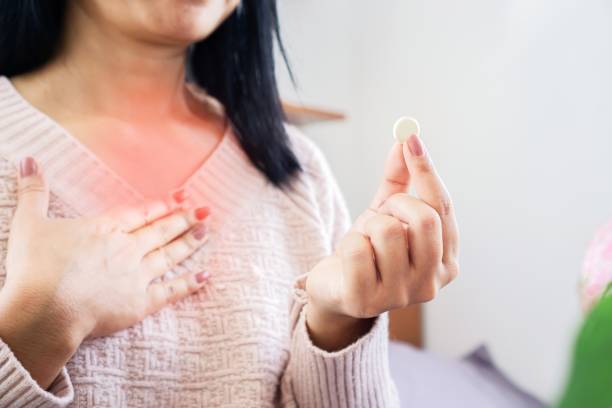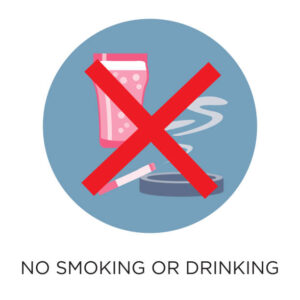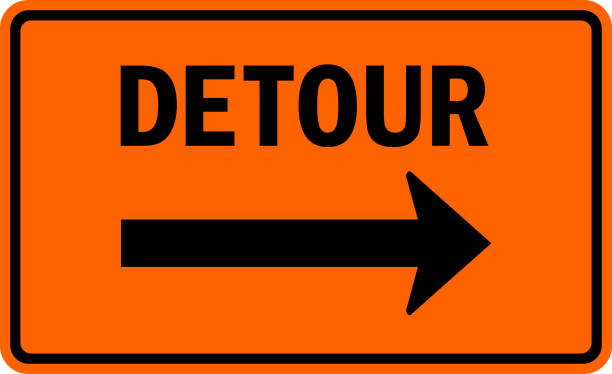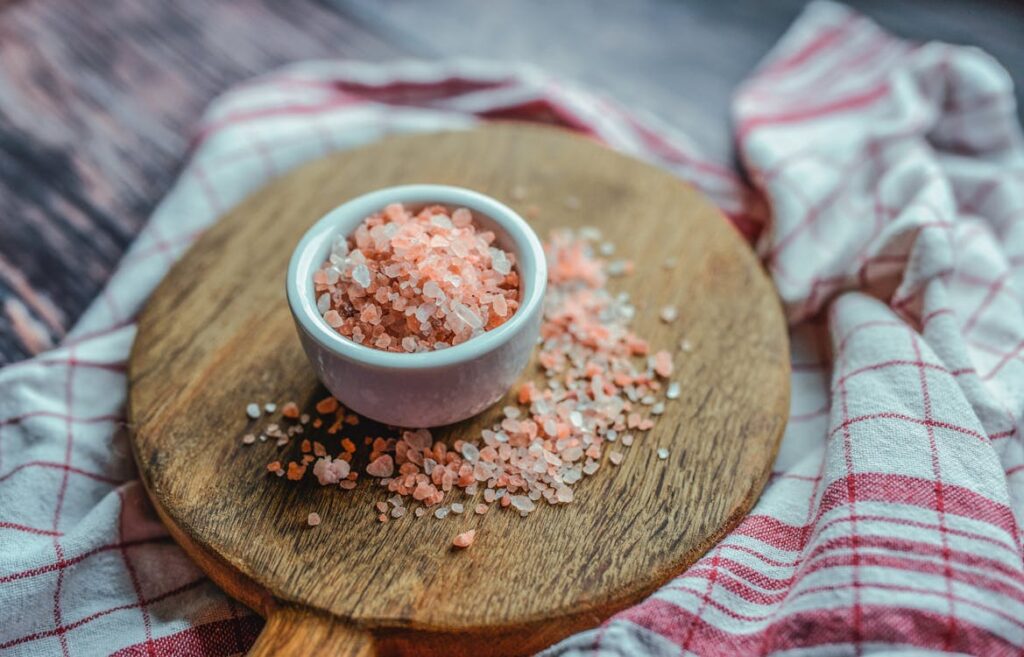GERD/Acid Reflux; A Common Ailment
Did you know that about 25% to 35% of American people suffer from GERD (Gastroesophageal reflux disease), otherwise known as chronic acid reflux and felt as heartburn. Drugs for this ailment are the 3rd most used in the country. Unfortunately, the drugs most commonly used help in the short term but only lead to a worsening of the condition over time. However, I have good news for you. This condition can be fairly easily and comparatively inexpensively reversed over a relatively short period of time. In this post I would like to explain what acid reflux is, what causes it, where it leads, and, most importantly, how to cure it. I will even let you know about a simple test you can easily do at home to check the health of your stomach acid level.
What is GERD?

Most people incorrectly assume that GERD results from too much stomach acid. In fact, the opposite is the case. It’s actually an underproduction of stomach acid such that the stomach is too alkaline so the valve between the stomach and esophagus does not close tightly enough. As a result, stomach acid can regurgitate back up into the esophagus which is not built to handle it. Designed with a protective coating, the stomach pH should be between 1 and 3. The esophagus only has enough protection for an occasional splash. Thus, when there is a continual back up of acids produced during digestion, you feel a burn as the esophagus and even the larynx suffers. Low pH or high acidity in the stomach stimulates the lower esophageal sphincter muscle (LES) responsible for closing that one-way valve to do so. The less acidic or higher pH your stomach is, the greater the problem you have.
Medicines and GERD
Most medicines such as Tums, Prilosec, Nexium, and others, work to reduce the acidity of your stomach so whatever comes back up through the valve doesn’t hurt as much. However, you might notice that this result is exactly the opposite of what is needed to actually reverse the problem. This is why people become more and more dependent on these medications.
You can have a doctor test the acidity of your stomach, but you can also do a simple test at home for a basic idea of your stomach acid health. Put ¼ teaspoon baking soda into a small glass of water and drink it. If it takes longer than 5 minutes to burp or you don’t burp at all, then your stomach is too alkaline or not acidic enough.
Other signs of low acidity in your stomach include constant burping, heartburn, indigestion, chronic nausea, loss of appetite or constant hunger, low energy, chronic constipation or undigested food in your stool.

Adverse Effects of Low Stomach Acid
Beside the discomfort of acid reflux, many other negative effects flow from not having proper acidity in your stomach. Sufficient acidity is necessary for proper digestion so that proteins are broken down, nutrients are absorbed, and pathogens are prevented from getting past the stomach.
Stomach Acid Protects Against Disease

The stomach acts as a significant barrier to protect against pathogens that come through the mouth and travel through the digestive system. Properly high acidity is vital to effectiveness in this role. Without it you will more easily get a stomach infection or SIBO, (small intestinal bacterial overgrowth,) as well as other pathogenic infections.
Stomach Acid Needed for Proper Digestion

Acidity prompts your stomach to release pepsin, your pancreas to release enzymes, and your liver to release bile. Without this being done fully, you cannot digest food properly and it stays in the stomach and digestive system too long. Protein doesn’t get broken down into the needed amino acids for your body to function. Not breaking down proteins can lead to more food allergies, autoimmune diseases, and risk of cancer in the stomach. It can also lead to an overgrowth of H Pylori. This is the bacteria that causes ulcers, where the protective barrier in your stomach is broken down. Stomach acid helps absorb vitamins and minerals such as calcium, iron, magnesium, potassium, and vitamins A, B, and C. Without enough acid you can become anemic from not absorbing enough iron. Of course, all sorts of ailments may arise from insufficient amounts of these amino acids, vitamins, and minerals.
Low Stomach Acid Causes Acid Reflux

Finally, improper and slow digestion from too little stomach acid produces the subject of this post, acid reflux. This regurgitation creates burning, pain, and indigestion, along with bloating and gas. If it goes on for a long time you can develop Barrett’s Esophagus where cells start to change and become pre-cancerous with Dysplasia. When food sits in the stomach too long it ferments and rots causing the gas and loss of appetite among other symptoms. Prilosec, often prescribed for GERD, inhibits the production of acid and has side effects which include vomiting, abdominal pain, gas, kidney inflammation, polyps, nausea, headaches, c diff infection, bone fractures, and irritable bowel syndrome.
Contributing Factors to Low Stomach Acid
Hypothyroidism, Medications, Caffeine, Nicotine, & Alcohol
Since all this is avoidable, let’s investigate the causes of acid reflux. Hypothyroidism may cause a loss of stomach acid. This is likely due to the fact that thyroid hormones play a role in the secretion of hydrochloric acid (the primary stomach acid). Hypothyroidism can also weaken the esophagus muscles including the lower esophageal sphincter, preventing it from closing fully.
Other factors that relax or weaken that sphincter muscle include nicotine, caffeine, and alcohol.
Additional contributing factors ubiquitous in our society today are NSAIDS, Aspirin, and some antibiotics. All these disrupt the balance of bacteria in the stomach and whole digestive system leading to this and other digestive issues.

Diet, Stress, Suppressed Immune System
Two other things hard to control that seem to play a role in low stomach acidity include a suppressed immune system, stress (especially long term), and increasing age.
Finally, diet most often plays a key role both directly and indirectly. High levels of sugars, carbohydrates, and processed foods with harmful seed oils all contribute to a rise in the harmful H pylori bacteria which produces ammonia, further alkalinizing the stomach and increasing the problem of acid reflux. Because this same diet usually leads to diabetes, it is unsurprising that diabetics are four times more likely to develop GERD. A high carb diet plays a role in potassium and magnesium deficiency as well as a B1 deficiency. All of these also hinder your body’s ability to produce stomach acid. Both a lack of iodine and a low salt diet negatively affect the acidity of the stomach. Salt is a needed precursor to the creation of HCl stomach acid.
Digestive systems need rest. Thus, eating too frequently hinders their effectiveness and also adds to the problem.

Help for Healing
After reading the post so far, you may be anxious to hear solutions to this ailment that won’t worsen it in the long term. If you are already taking medication you may want to talk to your doctor and come off of it slowly. (Though some have gone cold turkey). Let me start with the temporary and quick helpful tips.
Physical Positions and Apparel

If you have problems at night while lying down, it means acid is leaking through the partially opened esophageal sphincter valve. You should stop eating and drinking 2 hours before going to bed. You may also try placing the head of your bed on top of 2 bricks or pieces of wood to elevate it just slightly. You may not even notice the change, but it will allow gravity to help the acid stay down in the stomach rather than coming up. This is better than using more pillows because they might increase abdominal pressure. Wearing tight clothing around your abdomen also increases pressure in this area and should be avoided.
Adding Needed Acid
Adding acid to the stomach will help trigger the valve to close. Thus, drinking some apple cider vinegar diluted in a little water before eating is a cheap way to do this. Doing so through a straw will both lessen the taste if it bothers you and will protect the enamel on your teeth. Steve from Serious Keto has used this method effectively and tells his methods, amounts, and experience here.
Another over the counter remedy is a Betaine Hydrochloride (HCl) supplement. Zypan is a brand name that also has pepsin and enzymes. Dr. Berg recommends finding the proper dosage by starting with taking just 1 with your meal and observing how you feel. The next meal take 1 after the first bite and then an additional tablet a couple of bites later. Each meal gradually increase the dose mixed in with your food until you feel a warm feeling in the stomach. At that point you know that is too much for you. Or, if the acid reflux goes away then you know that is your proper dose. Most people need between 1 and 6 tablets.

Caution in These Cases


If you take a small amount of apple cider vinegar or betaine hydrochloride and you get burning in your stomach then you may have gastritis, (an inflamed lining of the stomach), or an ulcer. An ulcer is a hole in the lining of the stomach which needs healing before much acid is added. Cabbage has been tested and found to help heal ulcers without the side effects. It helps destroy the overgrowth of H pylori, the bacteria that attacks the stomach lining when your acids get too low, leading to ulcers. If cooked too much then the compound is destroyed. It can be green or red, steamed or raw as juice or otherwise. It can even be fermented as sauerkraut which does reduce its potency but brings out other vitamins as well. This is a link to the original study by Dr. Garnett Cheney. If your lining is just inflamed you may try okra and Pepsin E3 which can help more gently than apple cider vinegar or Betaine HCl.
If you take acid and it results in you having loose stools and diarrhea, then you likely have a problem with your bile flow. Easily flowing bile is critical for neutralizing the acid when it leaves your stomach. TC Hale with Kick it naturally has more information on both of these caveats to be cautious about along with other great videos and a course on digestion. See the one on bile here.
Aiding the Production of Stomach Acid

Salt is the raw material for the stomach’s production of HCl, (hydrochloric acid). This is why a low salt diet contributes to acid reflux. That is also why taking a pinch of unprocessed salt can help. In fact, increasing your intake of sea salt or another good quality salt can help GERD and provide other necessary good trace minerals you may be lacking.
Herbal and Supplementation Help
Other simple herbal remedies that some have found useful include licorice and ginger. Licorice seems to increase mucus production in the esophagus which can protect it from stomach acid. It may also help damaged tissues heal. DGL or deglycyrrhizinated licorice is most recommended by alternative health advocates for acid reflux. Ginger has anti-inflammatory properties that may reduce inflammation and the likelihood of acid traveling to the esophagus. It may also calm an upset stomach and speed up digestion. Chewing ginger or licorice or really anything also increases saliva production and soothes the esophagus.
Zinc is one trace mineral you may want to supplement to help. An electrolyte powder or supplement to increase potassium intake would also be recommended. Finally, as far as supplements, a good quality probiotic, (generally ones that require refrigeration}, will help improve the overall health of your GI tract.

Long Term Lifestyle Cures

All of these small or quick fixes will work better and longer term with a change in diet away from inflammatory foods. This may be a paleo diet that avoids all refined grains, legumes, refined sugars, and dairy products. Or you might go to a low carb, high fat keto/carnivore diet which also avoids most grains as well as sugars of all types. This diet I have detailed in previous posts. Unhealthy oils like soy and canola and the processed foods that use them, as well as many other additives tend to cause an inflamed and unhealthy digestive system that fosters GERD as well as other diseases. Changing to a healthy diet will also lead to a loss of weight if you are overweight and as a result it will decrease abdominal pressure.
Just as your diet may be a hard but necessary habit to break, smoking is another habit that must be broken in order to heal from this disease. Smoking inflames the stomach lining and relaxes the esophageal sphincter, so it doesn’t close off the valve from the stomach. Significant alcohol and caffeine should also be avoided since they also relax the valve.
Finally, long term stress must be mitigated. You may not even realize that you are living in a constant state of stress. It may have become a habit. If your body is constantly in fight or flight mode, it is not placing the needed energy and resources on digestion and other mundane functions necessary for a healthy life. Here’s one easy practice to start trying. Breathe deeply and slowly 5 or more times to relax and reduce stress before eating. This would also be a great time to stop and thank God for providing your food. In general, take time to practice breathing, relaxing, praying, or meditating on God and his Word. I’ll link this post where I spent more time on breathing techniques. Dr. Stan Eckberg also suggests MinTran, a supplement that can help calm naturally.
As you should know, I am not a doctor and so I would encourage you to watch the attached videos and study. Talk to your doctor and do more study of your own. However, I hope this information and these tips will lead you on a fairly quick path to significant improvement. If you try any of them consistently and find them to help, I would love to hear about it in a comment. If you have experienced problems and found other things that helped or didn’t, I would love you to share those as well. Please subscribe if you enjoy this content. Thanks, Christy

Tina l Rosario
Great info
thank.yoi
Christy
I always hope it makes a difference for someone. Thanks.